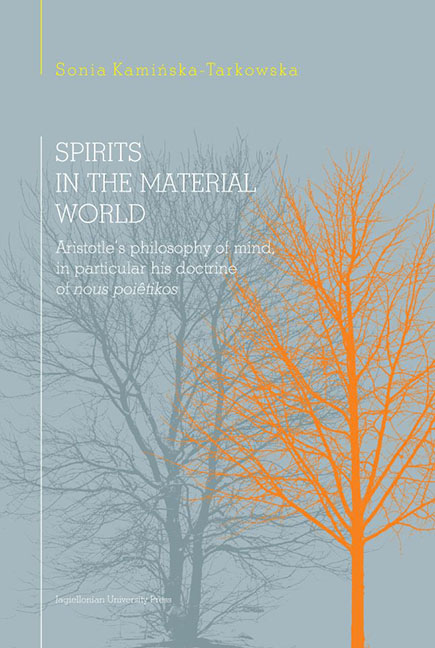 Spirits in the Material World
Spirits in the Material World Contemporary Thinkers
Published online by Cambridge University Press: 14 October 2023
Summary
Some Controversies about De Anima 3.7
Although 3.5 is the most cryptic chapter of De Anima, there are some controversies about 3.7 as well. I will sketch them briefly here. To this end I will use the paper by Klaus Corcilius ‘De Anima III 7: The Actuality Principle and the Triggering of Mental Episodes’ which – I hope – will enrich my current deliberations, especially when it comes to the issue of desire.
It is hard to see what Aristotle’s De Anima III 7 is about. The chapter starts out with a sentence that seems to be a verbatim quotation from DA III 5 while the rest seems to exhibit little thematic coherence, jumping back and forth between issues regarding sense perception, pleasure and pain, desire, and, perhaps predominantly, thought. It also seems that parts of the chapter discuss issues that have been previously discussed in the De Anima. There is certainly no obvious unifying theme in the text. This is why the chapter has puzzled interpreters from early on, some of whom openly admitted the lack of thematic unity. Most notably, Adolf Torstrik proposed a radical thesis. In his 1862 edition of the De Anima, he claimed that the chapter divides into 8 sections that lack any thematic unity whatsoever both with each other and with the preceding and the following chapters. He further claimed that in view of the heterogeneity of these sections, only a ‘very bad scribe (pessimum quidem scriptorem)’ could have put them together into one single chapter (the word he uses is ‘glued together’ conglutinare, p. XXV). Torstrik’s radical verdict was received rather favorably by later scholars. Thus, David Ross, in his widespread editions of the De Anima, accepted the verdict (while opting for a slightly different grouping of the sections), as did editors, translators and commentators such as Förster, Siwek, Theiler, and up until Christopher Shields in his recent translation and commentary. The resounding success of Torstrik’s claim is not difficult to explain. For he, apart from his brief argument for the thematic disunity of the chapter, provided also solid linguistic evidence to the effect that the parts of the chapter lack coherence even on a basic grammatical level.
- Type
- Chapter
- Information
- Spirits in the Material WorldAristotle's Philosophy of Mind in Particular His Doctrine of Nous Poiêtikos, pp. 141 - 172Publisher: Jagiellonian University PressPrint publication year: 2022
